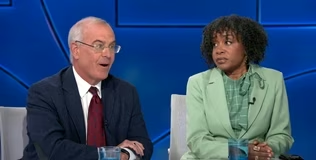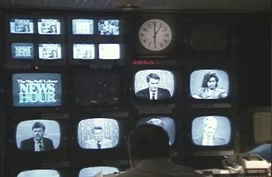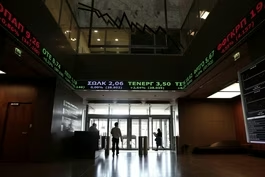
U.S. deploys carrier to Caribbean as drug strikes intensify
Clip: 10/24/2025 | 10m 7sVideo has Closed Captions
U.S. deploys aircraft carrier to Caribbean as strikes on suspected drug boats intensify
The Trump administration launched a major military and diplomatic escalation in its new war on drugs, sending an aircraft carrier to Latin America and sanctioning Colombia's president. It comes as the U.S. has increasingly targeted political leaders it opposes across the region, and as the military has launched an unprecedented number of deadly strikes in the Caribbean. Nick Schifrin reports.
Problems playing video? | Closed Captioning Feedback
Problems playing video? | Closed Captioning Feedback
Major corporate funding for the PBS News Hour is provided by BDO, BNSF, Consumer Cellular, American Cruise Lines, and Raymond James. Funding for the PBS NewsHour Weekend is provided by...

U.S. deploys carrier to Caribbean as drug strikes intensify
Clip: 10/24/2025 | 10m 7sVideo has Closed Captions
The Trump administration launched a major military and diplomatic escalation in its new war on drugs, sending an aircraft carrier to Latin America and sanctioning Colombia's president. It comes as the U.S. has increasingly targeted political leaders it opposes across the region, and as the military has launched an unprecedented number of deadly strikes in the Caribbean. Nick Schifrin reports.
Problems playing video? | Closed Captioning Feedback
How to Watch PBS News Hour
PBS News Hour is available to stream on pbs.org and the free PBS App, available on iPhone, Apple TV, Android TV, Android smartphones, Amazon Fire TV, Amazon Fire Tablet, Roku, Samsung Smart TV, and Vizio.
Providing Support for PBS.org
Learn Moreabout PBS online sponsorshipGEOFF BENNETT: Welcome to the "News Hour."
The Trump administration launched a major military and diplomatic escalation in its new war on drugs today, sending an aircraft carrier to Latin America and sanctioning Colombia's president.
Today's announcements come as the U.S.
has increasingly targeted political leaders it opposes across the region and as the military has launched an unprecedented number of deadly strikes in the Caribbean.
Here's Nick Schifrin with more.
NICK SCHIFRIN: Today in the Caribbean, another boat incinerated by a U.S.
missile, the 10th U.S.
strike since early September on what the administration calls drug boats, including three strikes this week alone.
Hours later, a major military expansion.
The Pentagon announced the deployment of the Gerald Ford carrier strike group with more than 6,000 service members to -- quote -- "disrupt narcotics trafficking and degrade and dismantle transnational criminal organizations."
DONALD TRUMP, President of the United States: The cartels are the ISIS of the Western Hemisphere.
NICK SCHIFRIN: Yesterday, President Trump and Secretary of Defense Pete Hegseth compared their efforts against drug cartels to the global war on terror against groups including al-Qaida and ISIS.
PETE HEGSETH, U.S.
Defense Secretary: If you reframe how you understand the world in our own hemisphere, that's exactly what these foreign terrorist organizations are.
And so we will track them, we will map them, we will network them and we will hunt them and kill them.
NICK SCHIFRIN: Just yesterday, the U.S.
flew B-1 bombers off the coast of Venezuela.
U.S.
officials say they're trying to pressure Venezuelan President Nicolas Maduro and senior military leaders who the U.S.
accuse of running a narco state by reducing the revenue they receive from drugs.
In response, today, Venezuela launched a national military deployment and Maduro vowed his people would fight American invaders.
NICOLAS MADURO, Venezuelan President (through translator): They would see the parade of millions of men and women with rifles in the fighting forces of the working class, the peasants, the fishermen and the neighborhoods throughout the country.
NICK SCHIFRIN: Diplomatically today, the Trump administration targeted another outspoken Latin head of state, Colombian President Gustavo Petro, accusing him of -- quote -- "allowing cocaine production in Colombia to explode and flood into the U.S."
On X, Petro responded, saying he'd spent decades fighting drug trafficking and so-called the sanctions -- quote -- "Quite a paradox, but not one step back and never on our knees."
DONALD TRUMP: I don't think we're going to necessarily ask for a declaration of war.
I think we're just going to kill people that are bringing drugs into our country.
NICK SCHIFRIN: But President Trump made it clear this week he will not seek Congress' approval to use deadly force, which on the Hill has sparked bipartisan disagreement.
SEN.
JACK REED (D-RI): We cannot let one man's impulsive decision-making entangle this nation in another conflict we neither need nor want.
SEN.
JAMES RISCH (R-ID): The president of the United States is doing exactly what he should be doing.
He's the commander in chief.
When he sees an invasion coming against the United States, he takes action.
I support him 100 percent.
NICK SCHIFRIN: As those two arguments indicate, the Trump administration's use of the military to combat drug cartels has sparked a debate over whether it's an appropriate and legal use of force.
So we have our own debate now.
Retired Lieutenant Colonel Rachel VanLandingham had a 20-year career in the Air Force and is now a law professor at Southwestern Law School.
And Nicholas Creel is a law professor at Georgia College and State University.
Thanks very much.
Welcome, both of you, to the "News Hour."
Rachel VanLandingham, let me start with you.
You heard from Pete Hegseth in that story, you heard from President Trump in that story comparing drug smugglers to members of ISIS and al-Qaida, and that they were going to do the same thing to the drug cartels that they did in the war on terror.
What's your response to that?
LT.
COL.
RACHEL VANLANDINGHAM (RET.
), Southwestern Law School: It's criminal and it's ludicrous to compare ISIS, a violent terrorist organization that beheaded people, that kidnapped and murdered women and children and little girls and killed people, to criminal drug cartels, in which this administration, if they can target them and bomb them and kill them extrajudicially, they can interdict them, detain them and prosecute them.
So the comparison to an actual violent war in which people are dying to this, right, just to exploit the use of the authority to use force to give Secretary Hegseth the ability to be judge, jury and executioner, I think, is abominable.
NICK SCHIFRIN: Nicholas Creel, is it abominable?
Is it ludicrous?
NICHOLAS CREEL, Georgia College and State University: I don't see it that way.
Unfortunately, our Constitution gives a lot of power and discretion to the executive when it comes to utilizing military force.
He's the commander in chief and he has the ability to utilize the military given to him and paid for by Congress in ways that he sees fit.
We may look at it and think it's a ludicrous judgment, but at the end of the day, it's his call to make.
And as to that, if we're using the standards of things like beheading and kidnapping, that's absolutely a hallmark, a feature, not a bug, of a lot of these cartels, where they are engaging in extremely violent behavior that's destabilizing to large regions of Latin America particularly.
NICK SCHIFRIN: Rachel VanLandingham, there are parts of Mexico where these cartels exhibit extraordinary levels of violence.
Take on that argument.
LT.
COL.
RACHEL VANLANDINGHAM: So those extraordinary levels of violence are not against the United States or United States citizens or United States property.
So those are against Mexico.
And if Mexico wants to come to us and say, hey, we need your help, we're engaged in a non-international armed conflict with these drug cartels in our country, then we can join them and help them.
We can't just unilaterally declare a war, so to speak, against criminals who are not directly attacking and imposing an imminent threat.
Of course, drugs pose a threat to the United States.
That's why the United States Navy and Coast Guard have been interdicting drug smugglers and the Department of Justice prosecuting them.
And if simply because the president can say that he has the authority, does that mean, to my colleague here, that the president can order the military to start killing alleged drug distributors on the United States streets?
Just because the president can say so doesn't make it lawful.
NICK SCHIFRIN: So, Nicholas Creel, as Rachel VanLandingham just said, just because the president says it doesn't make it legal.
NICHOLAS CREEL: Well, there's a difference between what makes it legal and what makes it a smart idea.
I do see it as being legal.
I would not see it as being particularly smart to go after particularly in the United States drug smugglers.
But to your point, right, could the United States just simply say we're going to go and interdict these individuals inside Mexico or inside some of these other Latin American countries because we deem it so, yes.
And to look back at the last few decades, we have done a great deal of this.
The war on terror in particular saw us going into other sovereign countries without permission to act.
We have done that in Syria.
We have done that in Pakistan.
That's where we got Osama bin Laden himself.
So we go into a lot of these countries because, principally, they're unwilling and unable.
And that's part of an emerging doctrine under international law that started under the war on terror really being put forward, because we saw that there were too many instances where the states themselves where these threats were growing were not able to really deal with them in a way.
So the only way for us to prevent those threats from coming back on us was to go in on our own and deal with them.
NICK SCHIFRIN: Rachel VanLandingham, let me bring in another point that we heard in our story that we prepared before this debate started, that President Trump says he does not need to go to Congress for an authorization of the use of military force.
In his words, we can just kill more of these what they call foreign terrorist organizations and members thereof.
What's your response to that argument?
LT.
COL.
RACHEL VANLANDINGHAM: Sure, if the president wants to shred the Constitution and completely ignore it.
The Constitution gives Congress, the branch of government most responsive to the people, the authority to declare war.
It originally said to make war, but the framers wanted to ensure the president knew that he or she had the duty and responsibility to repel sudden attack.
Outside of repelling a sudden attack, which we have no facts of that, Congress is supposed to be the one deciding whether or not to go to war, whether or not we're going to violate international law and go to war against drug cartels that are not organized armed groups who are engaged in violence against the United States or go to war against anyone else.
And why?
Because American blood is shed, the blood of our service members is shed, and the blood of innocent civilians winds up being shed when the United States actually engages in war.
It's one of the most -- and millions and millions of dollars of United States treasure and taxpayer money is shed.
So if we're going around killing people and exposing service members to death and injury, including physical injury and moral injury, it better be because our elected representatives, who are most close to the people, have decided so.
NICK SCHIFRIN: Nicholas Creel, does there need to be a congressional authorization of the use of military force?
NICHOLAS CREEL: Absolutely not.
The law and precedent makes pretty clear that would be the case.
So, as she had brought up, right, the original word that they were going to use instead of declare was make.
And they pulled back on that because they even understood then that we cannot wage war by committee.
It has to be an empowered executive that makes these calls.
And it goes back to that idea this is one of the biggest reasons why elections matter.
They have extreme, awesome power to utilize the forces given to them.
And, ultimately, this boils down to another problem of our current Constitution.
This is the Constitution of an 18th century agrarian nation that was lucky to be alive that never envisioned having large standing armies.
Now we are global superpower with massive standing armies at every corner of the globe.
So the old system that we developed for it isn't really good for what we have got now.
We need constitutional reform to bring this in, because, under the current framework, as we have seen, time and again, the president just does not get prior authorization from Congress in the vast majority of instances where he's utilized force.
Therefore, President Trump does not need to get congressional authorization to utilize force here.
NICK SCHIFRIN: Nicholas Creel, Rachel VanLandingham, thank you very much to you both.
NICHOLAS CREEL: Thank you.
LT.
COL.
RACHEL VANLANDINGHAM: Thank you, Nick.
As federal workers miss paychecks, many turn to food banks
Video has Closed Captions
Clip: 10/24/2025 | 7m 25s | As federal workers miss paychecks during shutdown, many turn to food banks for relief (7m 25s)
Brooks and Atkins Stohr on the East Wing demolition
Video has Closed Captions
Clip: 10/24/2025 | 10m 10s | Brooks and Atkins Stohr on the East Wing demolition (10m 10s)
A look at 50 years of the News Hour
Video has Closed Captions
Clip: 10/24/2025 | 10m 35s | A look at 50 years of the News Hour (10m 35s)
What happens when no one trusts a country’s economic data
Video has Closed Captions
Clip: 10/24/2025 | 6m 49s | What happens when no one trusts a country’s economic data (6m 49s)
Providing Support for PBS.org
Learn Moreabout PBS online sponsorship
- News and Public Affairs

FRONTLINE is investigative journalism that questions, explains and changes our world.

- News and Public Affairs

Amanpour and Company features conversations with leaders and decision makers.












Support for PBS provided by:
Major corporate funding for the PBS News Hour is provided by BDO, BNSF, Consumer Cellular, American Cruise Lines, and Raymond James. Funding for the PBS NewsHour Weekend is provided by...



